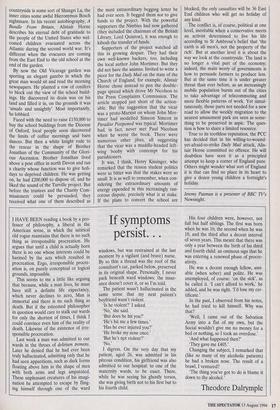If symptoms persist.. .
I HAVE BEEN reading a book by a pro- fessor of philosophy, a liberal in the American sense, in which the satirical old rogue maintains that there is no such thing as irresponsible procreation. He argues that until a child is actually born there is no one whose interests could be harmed by the acts which resulted in procreation. Ergo, irresponsible procre- ation is, on purely conceptual or logical grounds, impossible. This seems to me a little like arguing that because, while a man lives, he must have still a definite life expectancy, which never declines to zero, Man is immortal and there is no such thing as death. But if the esteemed philosopher in question would care to stalk our wards for only the shortest of times, I think I could convince even him of the reality of death. Likewise of the existence of irre- sponsible procreation. Last week a man was admitted to our wards in the throes of delirium tremens. Later he denied that he had ever been truly hallucinated, admitting only that he had seen apparitions, such as dark forms floating above him in the shape of men with both arms and legs amputated. These unpleasant creatures of his imagi- nation he attempted to escape by fling- ing himself through one of the ward windows, but was restrained at the last moment by a vigilant (and brave) nurse. By so thin a thread was the roof of the consultant's car, parked below, preserved in its original shape. Personally, I never park beneath ward windows: the insur- ance doesn't cover it, or so I'm told.
The patient wasn't hallucinated in the same sense that my next patient's boyfriend wasn't violent.
'Is he violent?' I asked.
'No,' she said.
'But does he hit you?'
'He's hit me a few times.'
'Has he ever injured you?'
'He broke my nose once.'
'But he's not violent?'
'No.'
I digress. On the very day that my patient, aged 26, was admitted in his piteous condition, his girlfriend was also admitted to our hospital: to one of the maternity wards, to be exact. There, while he was seeing his ghostly torsos, she was giving birth not to his first but to his fourth child. His four children were, however, not full but half siblings. The first was born when he was 16; the second when he was 18; and the third after a decent interval of seven years. This meant that there was only a year between the birth of his third and fourth child: an ominous sign that he was entering a renewed phase of procre- ativity.
He was a decent enough fellow, ami- able (when sober) and polite. He was unemployed, of course: 'on the sick', as he called it. 'I can't afford to work,' he added, and he was right. 'I'd lose my cer- tificate.'
In the past, I observed from his notes, he had tried to kill himself. Why was that?
'Well, I came out of the Salvation Army into a flat of my own, but the Social wouldn't give me no money for a bed or nothing, so I took an overdose.'
'And what happened then?'
'They gave me £405.'
Changing the subject, I remarked that (like so many of my alcoholic patients) he had a broken nose. The result of a brawl, I ventured?
'The thing you've got to do is blame it down to the alcohol.'
Theodore Dalrymple










































 Previous page
Previous page